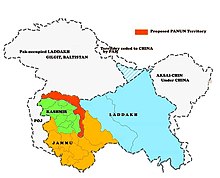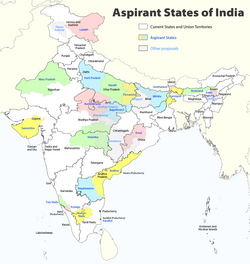Panun Kashmir

Panun Kashmir (English: Our Kashmir) is a proposed union territory of India in the Kashmir Valley, which is intended to be a homeland for Kashmiri Hindus. The demand arose after the Exodus of Kashmiri Hindus in 1990.[1][2][3][4][5] The vision of the homeland was elucidated in the Margdarshan Resolution of 1991. Panun Kashmir is also the name of an eponymously named organization.
Origin and etymology
Panun Kashmir is derived from Kashmiri panun kaśīr, which means "our own Kashmir". The Panun Kashmir organization was founded by Kashmiris, including Kashmiri Hindu writer and activist Agnishekhar, in 1990 after the exodus of Kashmiri Hindus from Kashmir, under threat from militants. Approximately 300,000[6][7][8] to 600,000[9][10][11] Kashmiri Hindus fled Kashmir due to rising armed rebellion in Kashmir. However, Panun Kashmir estimates nearly 700,000 refugees.[12]
Proposed union territory of Panun Kashmir
The organization passed a resolution, known as the Margdarshan Resolution,[13] in Jammu in December 1991 demanding:[14][15]
(a) the establishment of a Homeland for the Kashmiri Hindus in the Valley of Kashmir comprising the regions of the Valley to the East and North of Jhelum River.
(b) that the Constitution of India is made applicable in letter and spirit in this Homeland to ensure the right to life, liberty, freedom of expression and faith, equality, and the rule of law.
(c) that the Homeland be placed under the Central administration with a Union Territory status; and
(d) that all the seven hundred thousand Kashmiri Hindus, including those who have been driven out of Kashmir in the past and yearn to return to their homeland and those who were forced to leave on account of terrorist violence in Kashmir, be settled in the homeland on an equitable basis with dignity and honor.
Some advocates for Panun Kashmir wish that the majority of the valley of Kashmir and cities such as Srinagar, Anantnag, Sopore, Baramulla, and Awantipora be included in the proposed union territory. However, the organization claims that it does not seek a Hindu homeland. Instead, it seeks a homeland for Kashmiri Hindus who are ready to live peacefully with their Muslim neighbors assuming the conditions are met for resettlement.
Support
The Panun Kashmir organization has consistently pushed for a separate UT. The organization also strongly supported the abrogation of Article 370 and Article 35a.[16]
Ikkjutt Jammu, a political party was in Jammu and Kashmir, openly supported for a separate Panun Kashmir, as well as the separation of Jammu Division from Kashmir.[17][18][19]
Opposition
On 28 November 2019, the consul-general of India in New York suggested adopting an "Israeli model" for Kashmir to aid the return of the Kashmiri Pandits, the minority Hindu community that left the region following the 1989 insurgency.[20] His hour-long video sparked outrage. Kashmiri Muslims activists and some Hindu Kashmiris feared that this would lead to worsening military control, losing their jobs to outsiders, and the loss of their identity by causing Hindus to replace the Muslim majority. This proposition has been compared to a "settler-colonial project", and Pakistani Prime Minister Imran Khan condemned the proposal as reflecting "the fascist mindset of the Indian government".[21][22]
After the murder of Rakesh Pandit by unidentified militants in June 2021, several members of the Panun Kashmir group proposed a military campaign to establish a separate Hindu region, where Kashmiri Pandits would be armed against local militants. That meeting and their proposed Union Territory have been opposed by Muslim activists, who compared the proposal to Israeli actions against the Palestinians.[23][24][25]
See also
- Hinduphobia
- Insurgency in Jammu and Kashmir
- Persecution of Hindus
- Women's rights in Jammu and Kashmir
References
- ^ Excelsior, Daily (9 January 2017). "Involve 'Panun Kashmir' in talks on return of KPs: Ambardar". Retrieved 14 March 2019.
- ^ Wirsing, Robert (2003). Kashmir in the Shadow of War: Regional Rivalries in a Nuclear Age. M.E. Sharpe. p. 149. ISBN 9780765610898.
- ^ PTI, (Press Trust of India) (28 July 2019). "Carve out separate state within India for Kashmiri Pandits along Jhelum river: Panun Kashmir". India Today. Retrieved 25 October 2019.
- ^ "700 eminent Kashmiri Pandits support Centre's decision on Article 370: Panun Kashmir". Business Standard India. Press Trust of India. 22 August 2019. Retrieved 25 October 2019.
- ^ "Post 370, Kashmiri Hindus wait to return to their homes". The Sunday Guardian Live. 19 October 2019. Retrieved 25 October 2019.
- ^ Singh, Devinder (21 November 2014). "Reinventing Agency, Sacred Geography and Community Formation: The Case of Displaced Kashmiri Pandits in India". The Changing World Religion Map. Dordrecht: Springer Netherlands. pp. 397–414. doi:10.1007/978-94-017-9376-6_20. ISBN 9789401793759.
- ^ "Protection Aspects of Unhcr Activities on Behalf of Internally Displaced Persons". Refugee Survey Quarterly. 14 (1–2): 176–191. 1995. doi:10.1093/rsq/14.1-2.176. ISSN 1020-4067.:The mass exodus began on 1 March 1990, when about 250,000 of the 300,000 Kashmiri Pandits fled the State
- ^ Yong, Amos (2011). "Constructing China's Jerusalem: Christians, Power, and Place in Contemporary Wenzhou - By Nanlai Cao". Religious Studies Review. 37 (3): 236. doi:10.1111/j.1748-0922.2011.01544_1.x. ISSN 0319-485X.
- ^ "CIA - The World Factbook -- India". 13 May 2009. Archived from the original on 13 May 2009.
at least 600,000 (about half are Kashmiri Pandits from Jammu and Kashmir) (2007)
{{cite journal}}: Cite journal requires|journal=(help) - ^ Casimir, Michael J.; Lancaster, William; Rao, Aparna (1 June 1997). "Editorial". Nomadic Peoples. 1 (1): 3–4. doi:10.3167/082279497782384668. ISSN 0822-7942.:From 1947 on, Kashmir's roughly 700,000 Hindus felt increasingly uneasy and discriminated against, and youth … from a variety of sources such as Islamist organizations, Islamic countries, Kashmiri Muslim fundraisers in the West, and migrant labor from Azad Kashmir in the …
- ^ Sarkaria, Mallika Kaur (2009). "Powerful Pawns of the Kashmir Conflict: Kashmiri Pandit Migrants". Asian and Pacific Migration Journal. 18 (2): 197–230. doi:10.1177/011719680901800202. ISSN 0117-1968. S2CID 145137184.: Mr. Zalpuri... believes "it could be anything between 300,000 to 600,000 people"
- ^ "A Homeland for the Kashmiri Pandits". Panun Kashmir. Archived from the original on 29 October 2013.
- ^ PTI (12 February 2017). "Modi govt has no objection to the homeland for Kashmiri Pandits, says Jitendra Singh". mint. Retrieved 21 December 2021.
- ^ Noorani, A. G. (9 July 2016). "Kashmir's Pandits". Dawn. Archived from the original on 12 July 2021. Retrieved 21 December 2021.
- ^ "Why Homeland? Introduction". Panun Kashmir. Archived from the original on 29 October 2013.
- ^ "Panun Kashmir faction wants abrogation of Article 370". 3 February 2007.
- ^ "We Should be Trained with Arms, Necessary to Form Israel in Kashmir: Pandit Activist". 9 June 2021.
- ^ "Forget Delimitation; Divide Kashmir; Grant Statehood to Jammu: IkkJutt Jammu - the Northern Herald".
- ^ "Chorus grows louder for statehood to Jammu". 10 June 2021.
- ^ Ibrahim, Shameel (28 September 2020). "Why Indian-occupied-Kashmir is on the road to settler colonialism". Medium. Retrieved 8 February 2024.
- ^ "Anger over India's diplomat calling for 'Israel model' in Kashmir".
- ^ "Bringing the Israeli model to Kashmir".
- ^ ""Important to make an Israel": Kashmiri Pandit leaders want military approach". 7 June 2021. Archived from the original on 7 June 2021.
- ^ "'If the Israeli people can do it. We can also do it: Normalisation of Israel's colonial desires". The Kashmir Walla. 24 June 2021. Archived from the original on 24 June 2021.
- ^ "'Sacrifice and surrender': RSS's mantra for Kashmiri Pandit rehabilitation". 14 June 2021. Archived from the original on 14 June 2021.
External links

